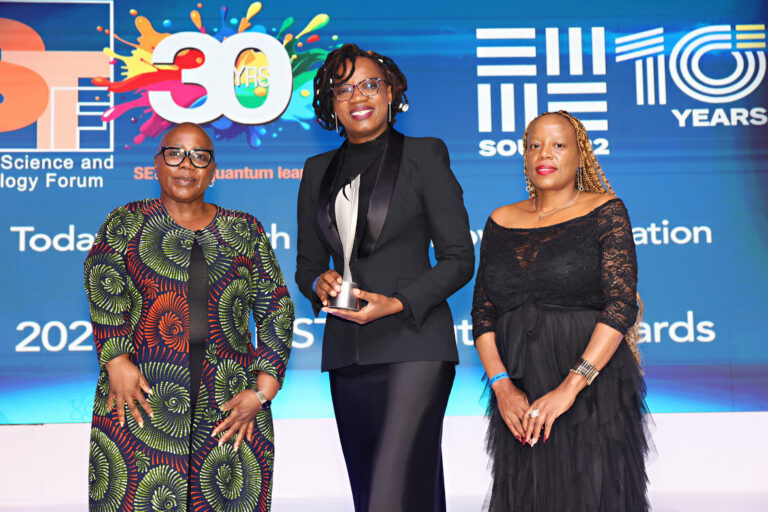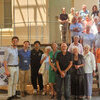African-led neuroscience research earns national science recognition
08 August 2025 | Story Ayanda Mthethwa. Photo NSTF Read time 4 min.
Dr Rachael Dangarembizi, a neuroscientist at the University of Cape Town (UCT), has been awarded the TW Kambule-NSTF Award: Emerging Researcher at the 2024/2025 National Science and Technology Forum (NSTF)-South32 Awards. The award recognises her pioneering research on cryptococcal meningitis (CM) – a disease that continues to cause untold devastation in Sub-Saharan Africa yet remains significantly under-researched.
The NSTF-South32 Awards are among the country’s highest honours in science, engineering, technology and innovation, recognising excellence and celebrating South Africa’s research and innovation capacity.
For Dr Dangarembizi, the award is both a personal milestone and a recognition of work that confronts one of the region’s most urgent and overlooked public health challenges. “Research on fungal infections has been historically neglected in research, funding and policy yet it is urgent and important. This is especially true for Africans, because we lose hundreds of thousands of people every year to brain infections caused by fungi,” said Dangarembizi.
Addressing fungal infections of the brain
CM is a deadly fungal infection of the brain and the leading cause of meningitis-related deaths in people living with HIV. The disease primarily affects populations in Sub-Saharan Africa, where barriers to timely diagnosis and access to effective treatment remain widespread.
“I have an army of young and energetic students that are pushing this work here in Africa.”
In South Africa, the burden of CM is especially high and its consequences profound. Determined to shift the focus toward this neglected illness, Dangarembizi established Africa’s first dedicated laboratory for this research, known as the CryptoLab, based at UCT. Her work examines how CM causes brain injury, with the aim of improving understanding of the disease and contributing to the development of more effective interventions.
She dedicated the award to her students: “I have an army of young and energetic students that are pushing this work here in Africa. We’re the first lab to do this, and they are doing well. This award is for my students.” She also acknowledged the institutional support that made the work possible. “I would like to thank my institution, UCT, for providing me with an enabling environment. I tried this elsewhere and it didn’t work. But I came to Cape Town, and it worked. Thank you so much, UCT, for supporting me.”
An enabling environment is key to impactful research
“Dr Dangarembizi’s recognition gives impetus to the critical role of African-led research in tackling diseases that disproportionately affect the continent, and the importance of creating spaces where that research can thrive,” said Professor Jeff Murugan, acting Deputy Vice-Chancellor for Research and Internationalisation at UCT.
Professor Murugan added that UCT’s dedication to advancing Africa’s scientific knowledge production and capacity to solve its own challenges is what drives the university’s research mission. “When we support researchers like Dangarembizi, we’re not just advancing science, we’re investing in people who are deeply committed to improving the lives of others. That’s what makes the university’s work so meaningful.”
In addition to conducting research and supervising postgraduate students, Dangarembizi, a recent awardee of the United Kingdom Research and Innovation (UKRI) African Research Leader Award, is the current chairperson of the Southern African Neuroscience Society (SANS), the regional neuroscience society for 10 Southern African Development Community (SADC) countries. She is also one of the directors of the ALBA Network, an international organisation promoting equity and inclusivity in brain sciences globally.
“We also recognise and celebrate all the finalists and nominees whose work is equally vital.”
One of her goals is to advance neuroscience research in developing institutions and as part of her academic citizenship, she lectures neuroscience in low-resourced institutions in Sub-Saharan Africa including at the National University of Science and Technology in Zimbabwe.
In addition, Murugan acknowledged the 13 UCT nominees and nine finalists for the awards: “We also recognise and celebrate all the finalists and nominees whose work is equally vital. Being acknowledged at this level is a significant achievement and reflects the depth of research talent at UCT.”
 This work is licensed under a Creative Commons Attribution-NoDerivatives 4.0 International License.
This work is licensed under a Creative Commons Attribution-NoDerivatives 4.0 International License.
Please view the republishing articles page for more information.










